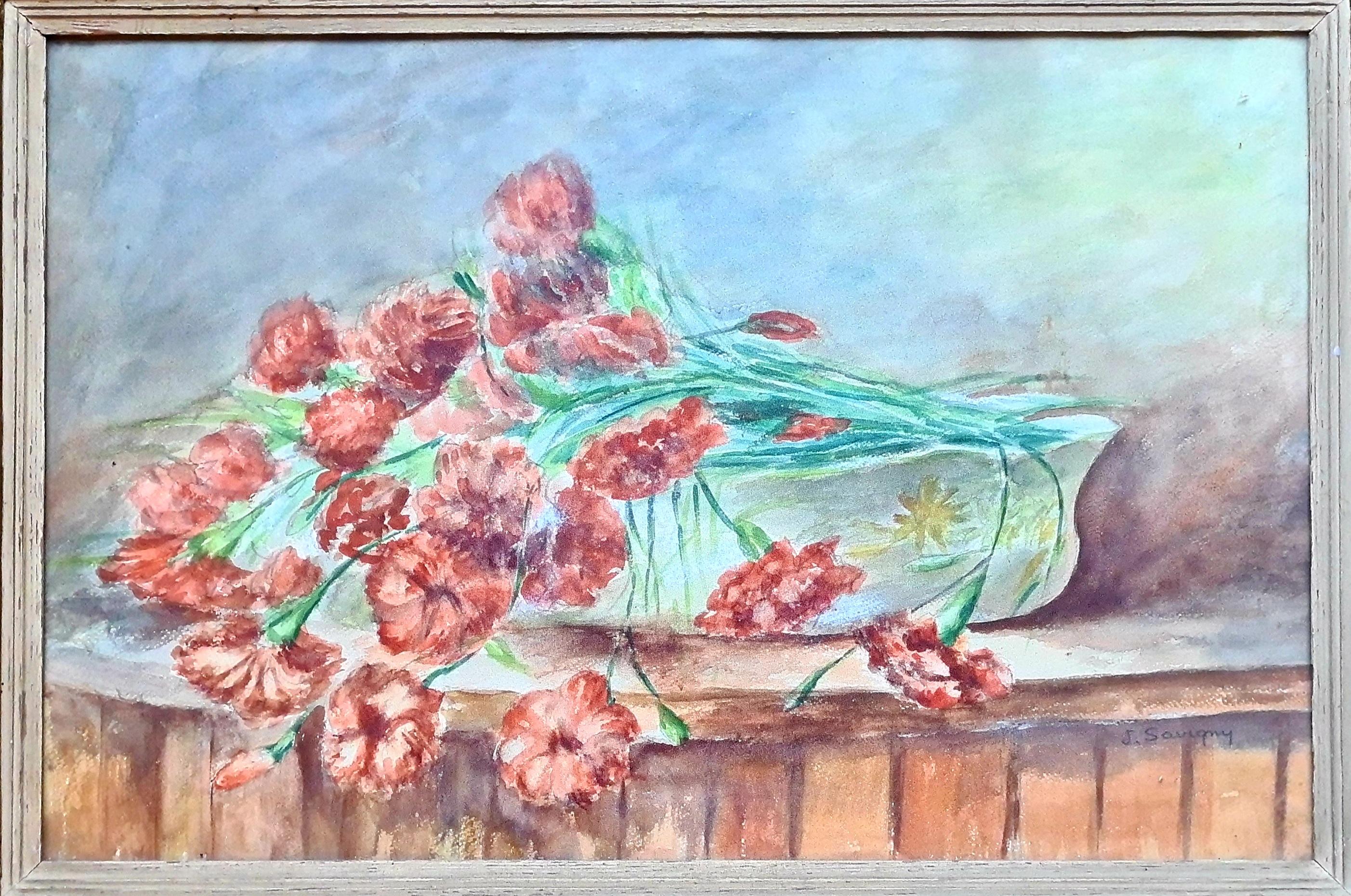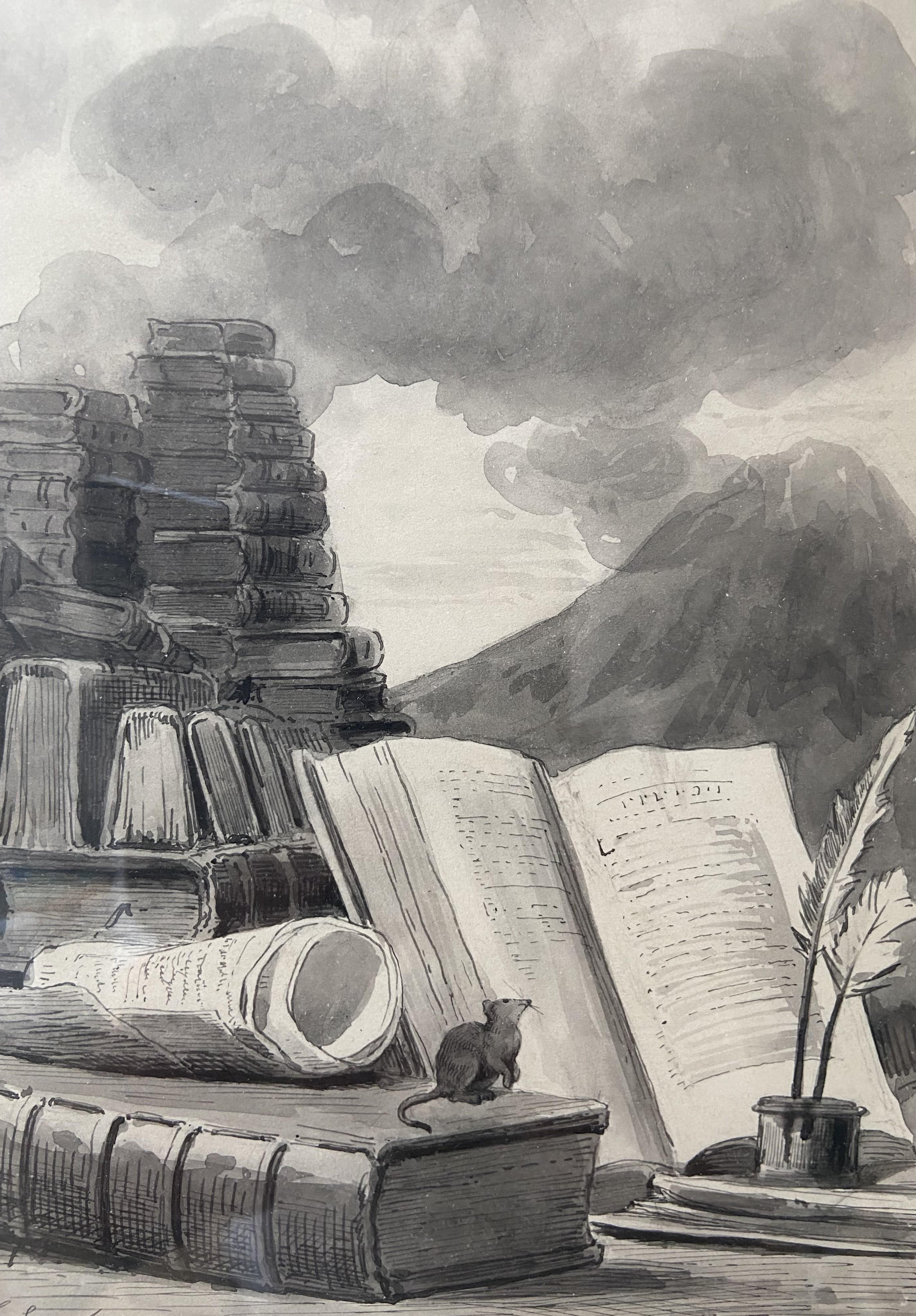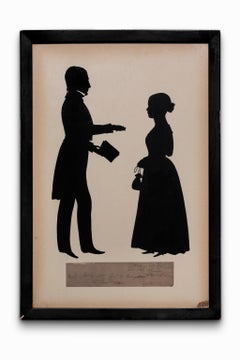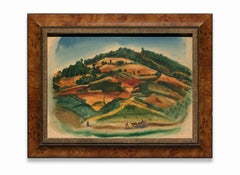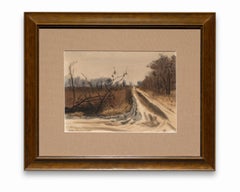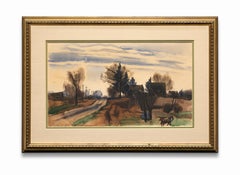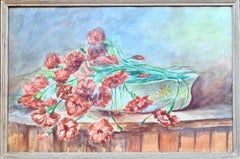Items Similar to "Untitled (Red Flower)" Watercolor on Paper, Abstract Flower, Signed & Dated
Want more images or videos?
Request additional images or videos from the seller
1 of 11
Charles Culver"Untitled (Red Flower)" Watercolor on Paper, Abstract Flower, Signed & Dated1950
1950
About the Item
Flowers were one of Culver's favorite subject. This stunning portrait of a red flower draws the viewer into its very center as powerfully as any flower portrait by Georgia O'Keeffe. It is the idyllic flower that can be described as in the romantic style wherein the subject depicted is a more desired or dramatic version of what actually is. It is signed and dated by the artist on the lower left. This piece has been professionally reframed with acid-free matting and museum glass.
In a 1952 Detroit Free Press article, entitled “Artist Explains His Work,” Culver was asked why he painted the way he did. He stated: “I try to ‘see’ though not too exactly; I try to think though not too ponderously; I feel emotion yet I try not to become overwrought. I interpret rather than describe, and design rather than depict. I work with values, not light and shade; hence, when I am successful, I achieve substance rather than three-dimensional form, and this satisfies me as being wholly sufficient. In my work I wish to be serious without becoming a bore, exuberant without being frivolous, humorous without being silly. I believe that good paintings are conceived, not contrived; and I am interested in art much more than in pictures.”
Charles Culver was born in Chicago, 1908, and by his early 20’s was studying commercial art which would provide a skill for a job, but was not his first choice for artistic study. In the 1920s he worked as a cartoonist for the Royal Oak Tribune. He wrote and illustrated several “children’s” books which were really intended for a more adult audience, now called graphic novels a hundred years later. He was also a musician, tenor sax and clarinet, and went on the road with Gene Goldkette. While living in Bellaire, Michigan, in the 1950s he was a regular in jam sessions at a popular local bar.
He worked on and off at the Chevrolet Studios in the General Motors Building in Detroit, located on W. Grand Blvd. near Woodward, as a commercial artist. He did this in order to make enough money to support himself and his wife for a couple years at a time during which he painted full time. He did this work/paint regimen until he finally gained enough recognition by the 1930’s to begin receiving invitations to exhibit his paintings in galleries such as the Gordon Beer Gallery in Detroit, the Detroit Artists Market, the Michigan Artists at the DIA, the Butler Institute of American Art in Youngstown, Ohio, and the International Watercolor Exhibition at the Art Institute of Chicago, to name a few.
In the 50s, he commenced his ten-year teaching career at Arts and Crafts in Detroit, now known as College for Creative Studies. Arts and Crafts was an important formative artistic teaching institution for many local and national artists. Some of the faculty and graduates include Richard Jerzy, Harry Bertoia, Doug Chaing (currently director of Lucas Film), Stephen Dinehart (game maker, writer, designer connected with The David Lynch Foundation), Tyree Guyton (international artist), Herb Babcock, Jerome Feretti, Kevin Siembieda (writer, designer and publisher of role-playing games), Renee Radell, Philip Pearlstein, Charles McGee (nationally recognized African American sculptor of animal and dancing spirits), Philip Pearlstein (2000 Honorary Doctorate, Modern Realism style), John Louis Krieger (American Modern), William Girard (American Modern), Henry Heading, Hughie Lee-Smith, and Joseph Wesner. Culver wrote a monthly newsletter for the faculty and students called Topic and Talk, established his humorous philosophy and vocabulary. He took on the role of art critic for the Detroit Free Press for two years during which he verbally slashed to pieces what he perceived to be the pretensions of avant-garde art.
Culver had over 25 one-man shows in the Detroit area alone, won 14 prizes at the “Exhibition for Michigan Artists” sponsored by the Detroit Institute of Arts, including the Scarab Club Gold Medal in 1940-43, and is represented, according to a curator at the DIA with sole 90 paintings in the DIA’s permanent collection, more than any other Michigan artist. His work is found in museums and private collections both nationally and internationally.
- Creator:Charles Culver (1908 - 1967)
- Creation Year:1950
- Dimensions:Height: 20.5 in (52.07 cm)Width: 17 in (43.18 cm)
- Medium:
- Movement & Style:
- Period:
- Condition:
- Gallery Location:Detroit, MI
- Reference Number:1stDibs: LU128617986512
About the Seller
5.0
Vetted Professional Seller
Every seller passes strict standards for authenticity and reliability
Established in 2014
1stDibs seller since 2019
106 sales on 1stDibs
Typical response time: 1 to 2 days
- ShippingRetrieving quote...Shipping from: Detroit, MI
- Return Policy
Authenticity Guarantee
In the unlikely event there’s an issue with an item’s authenticity, contact us within 1 year for a full refund. DetailsMoney-Back Guarantee
If your item is not as described, is damaged in transit, or does not arrive, contact us within 7 days for a full refund. Details24-Hour Cancellation
You have a 24-hour grace period in which to reconsider your purchase, with no questions asked.Vetted Professional Sellers
Our world-class sellers must adhere to strict standards for service and quality, maintaining the integrity of our listings.Price-Match Guarantee
If you find that a seller listed the same item for a lower price elsewhere, we’ll match it.Trusted Global Delivery
Our best-in-class carrier network provides specialized shipping options worldwide, including custom delivery.More From This Seller
View AllAugust Edouart Silhouette Cut Paper 1840 "Rev & Mrs E H Cumpston"
By August Edouart
Located in Detroit, MI
SALE ONE WEEK ONLY
"The Rev. and Mrs. E. H. Cumpston" a silhouette cut by August Edouart is in very good condition and cut by the artist sometime between 1839 - 1849. On the lower f...
Category
1850s Romantic More Art
Materials
Paper
Charles Culver Watercolor Landscape "Red Hills Near Patzcurao" Signed & Dated
Located in Detroit, MI
The idyllic atmosphere of this Mexican scene is located in Mexico, west of Mexico City and south of Guadalajara. “Red Hills Near Patzcuaro” is set in a golden light. and was one of three paintings by the artist while the artist visited Patzcuaro, Mexico. The humans depicted lend an atmosphere to the painting and an indication of location - dressed in native Mexican peasant dress - without being obtrusive and causing the viewer to concentrate on them. The intense red hills of Patzcuaro are the feature in this painting along with the pinon and juniper trees and the Chamisa shrub. This piece has been professionally reframed with acid-free matting and museum glass.
In a 1952 Detroit Free Press article, entitled “Artist Explains His Work,” Culver was asked why he painted the way he did. He stated: “I try to ‘see’ though not too exactly; I try to think though not too ponderously; I feel emotion yet I try not to become overwrought. I interpret rather than describe, and design rather than depict. I work with values, not light and shade; hence, when I am successful, I achieve substance rather than three-dimensional form, and this satisfies me as being wholly sufficient. In my work I wish to be serious without becoming a bore, exuberant without being frivolous, humorous without being silly. I believe that good paintings are conceived, not contrived; and I am interested in art much more than in pictures.”
Charles Culver...
Category
1940s Naturalistic Landscape Drawings and Watercolors
Materials
Paper, Watercolor
Charles Culver Landscape Winter Road Watercolor Signed & Dated
Located in Detroit, MI
The idyllic atmosphere of this country scene falls within a couple of styles one being regionalism, an American realist modern art movement that included paintings, murals, lithographs, and illustrations depicting scenes of rural and small-town America primarily in the Midwest and frequently associated with Grant Wood and Thomas Hart Benton. The other style is romanticism wherein the scene depicted is a more desired or dramatic version of what actually is. “Untitled (Winter Road)” is a quiet country scene depicting a road leading into the distance either going to or coming from a local farm. The snow does not particularly seem fresh suggesting a melt and the coming of spring.
This piece has been professionally reframed with acid-free matting and conservator glass.
In a 1952 Detroit Free Press article, entitled “Artist Explains His Work,” Culver was asked why he painted the way he did. He stated: “I try to ‘see’ though not too exactly; I try to think though not too ponderously; I feel emotion yet I try not to become overwrought. I interpret rather than describe, and design rather than depict. I work with values, not light and shade; hence, when I am successful, I achieve substance rather than three-dimensional form, and this satisfies me as being wholly sufficient. In my work I wish to be serious without becoming a bore, exuberant without being frivolous, humorous without being silly. I believe that good paintings are conceived, not contrived; and I am interested in art much more than in pictures.”
Charles...
Category
1940s Naturalistic Landscape Drawings and Watercolors
Materials
Paper, Watercolor
Charles Culver Landscape "Late Afternoon Landscape" Watercolor on Paper
Located in Detroit, MI
“Late Afternoon Landscape” is set in the golden light of evening painted in the mid-west town of Utica, Michigan. It has the atmosphere of when work is done and peace and quiet blanket the countryside. The The farm machinery has ceased its racket as has the family dog wandering about for one last sniff. This piece has been professionally reframed with acid-free matting and conservative glass.
In a 1952 Detroit Free Press article, entitled “Artist Explains His Work,” Culver was asked why he painted the way he did. He stated: “I try to ‘see’ though not too exactly; I try to think though not too ponderously; I feel emotion yet I try not to become overwrought. I interpret rather than describe, and design rather than depict. I work with values, not light and shade; hence, when I am successful, I achieve substance rather than three-dimensional form, and this satisfies me as being wholly sufficient. In my work I wish to be serious without becoming a bore, exuberant without being frivolous, humorous without being silly. I believe that good paintings are conceived, not contrived; and I am interested in art much more than in pictures.”
Charles Culver...
Category
1940s Naturalistic Landscape Drawings and Watercolors
Materials
Paper, Watercolor
"Untitled (Dock Scene)" Watercolor on Paper, Local Scene, Buildings, Water
Located in Detroit, MI
The idyllic atmosphere of this local dock scene falls within a couple of styles one being regionalism, an American realist modern art movement that included paintings, murals, lithographs, and illustrations depicting scenes of rural and small-town America primarily in the Midwest and frequently associated with Grant Wood and Thomas Hart Benton. The other style is romanticism wherein the scene depicted is a more desired or dramatic version of what actually is. “Untitled (Dock Scene)” is typical of a small town dock scene from Michigan where Culver lived or from places as far away as Maine, but what makes it important is its easy familiarity: water, gulls or terns, slanting wood shanties, scruffy dirt patches and course grasses. It is not idealized, but does set the tone of fresh air, the scream of birds and the sun on water. This piece has been professionally reframed with acid-free matting and museum glass.
In a 1952 Detroit Free Press article, entitled “Artist Explains His Work,” Culver was asked why he painted the way he did. He stated: “I try to ‘see’ though not too exactly; I try to think though not too ponderously; I feel emotion yet I try not to become overwrought. I interpret rather than describe, and design rather than depict. I work with values, not light and shade; hence, when I am successful, I achieve substance rather than three-dimensional form, and this satisfies me as being wholly sufficient. In my work I wish to be serious without becoming a bore, exuberant without being frivolous, humorous without being silly. I believe that good paintings are conceived, not contrived; and I am interested in art much more than in pictures.”
Charles Culver...
Category
1940s Naturalistic Landscape Drawings and Watercolors
Materials
Watercolor, Paper
"Song of Songs Illustration" Old Testament, Watercolor
Located in Detroit, MI
SALE ONE WEEK ONLY
"Song of Songs Illustration" renders an important bibilical story that is celebrated during Jewish Passover. Song of Solomon, also called Canticle of Canticles, or Song of Songs, an Old Testament...
Category
Mid-20th Century Other Art Style Animal Drawings and Watercolors
Materials
Paper, Watercolor
You May Also Like
White Irises / botanical watercolor
By Adrienne Sherman
Located in Burlingame, CA
'White Irises' is a sophisticated subdued, ivory-cream with warm brown to bronze still life flower composition. The botanical watercolor created b...
Category
21st Century and Contemporary Romantic Still-life Drawings and Watercolors
Materials
Watercolor, Archival Paper
The Carnations
Located in Cotignac, FR
A mid 20th century watercolour on paper of carnations in a bowl by French artist J Savigny. The painting is signed bottom right and presented in a period patinated and gilt wood and ...
Category
Mid-20th Century Romantic Still-life Drawings and Watercolors
Materials
Paper, Watercolor
Landscape by Moonlight, Waterfall, Monthelier, French Romantic Art, Christmas
Located in Greven, DE
Fine Watercolour Drawing by Alexandre Jules Monthelier. He was a French Artist who worked in France and created many drawings of famous landscape and sceneries (e.g. the cathedral of...
Category
19th Century Romantic Landscape Drawings and Watercolors
Materials
Watercolor, Handmade Paper
French Orientalist Art, Old Master Drawing Elephants, Hunt and Soldiers, Nature
Located in Greven, DE
Guignet was born in Annecy and grew up in the city of Autun. He was a friend of Hippolyte Michaud. He was a rather popular orientalist painter in h...
Category
Mid-19th Century Romantic Still-life Drawings and Watercolors
Materials
Handmade Paper
$884 Sale Price
20% Off
Pair of Sea Views, decorative Drawings, Marine Interior, French Coast, Moin
Located in Greven, DE
A Pair of Drawings, Framed
Signed and dated 1855
Chalk in black, brown wash, heightened with white, on paper
each sheet, 46 x 31 cm . Framed.
Two Landscape and Sea View Old Master Drawings, Paris, 18th Century, by Mozin
Charles Louis Mozin (* 12 March 1806 in Paris; † 7 November 1862 in Trouville-sur-Mer) was a French painter. He is the grandfather of the Post-Impressionist Fernand Piet.
The brother of the composer Théodore Mozin was a pupil of Xavier Leprince. He is considered the "discoverer" of Trouville-sur-Mer, which developed into a popular seaside resort at the end of the 19th century. At the age of nineteen, he first came to the fishing village on the coast...
Category
19th Century Romantic Landscape Drawings and Watercolors
Materials
Paper, Chalk
Louis-Eugène Lambert (1825-1900) The Mountain and the mouse, drawing signed
By Louis Eugène Lambert
Located in Paris, FR
Louis-Eugène Lambert (1825-1900)
La Montagne qui accouche d'une souris (The Mountain and the mouse)
Pen and black ink, ink wash on paper
Signed lower ...
Category
1870s Romantic Still-life Drawings and Watercolors
Materials
Ink
Recently Viewed
View AllMore Ways To Browse
Red Flowers
Painting And Flowers And Red
Michigan Artists
Still Life Game
Vintage Detroit Sign
Still Life Game Painting
Charles Gaines
50s Flower
Dancing Flower Vintage
African American Artist Still Life
Culver Signed
1950 African Portrait
Vintage Beer Signs
Artist First Name Lee
Gordon And Smith
John Beer
Gordon Smith
African American Portraits Of 1940
